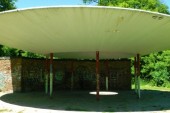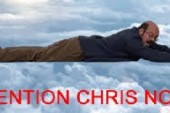
Before tonight’s airing of the first of its two-part season finale, allow me get this out of the way: NBC’s Community is not only the greatest thing on TV right now, it’s also the first post-postmodern sitcom. But lest you level the (possibly true) accusation that I simply have a crush on cast member Alison Brie, maybe first some background.
If you looked at the definitive American comedies of the past 20 years or so, they all share a common trait: a scepticism for those tired clichs we used to call ‘truths’. Arrested Development, for example, took those platitudes about the importance of family and turned them on their head. The Bluths were the most destructive, dysfunctional, incestuous group of people this side of a Jersey Shore episode. Meanwhile, Seinfeld, famous for being about nothing, ended its nine season run with its characters in jail, unrepentant and seeming to have learned nothing at all.
Historically speaking, though – and really who doesn’t love a good historical-ideological analysis of TV sitcoms? – this all made sense. If the postmodern era saw the end of those grand truths and meta-narratives that simply didn’t hold up anymore, comedy, that mirror held up to society, reflected their demise. Instead of Leave it to Beaver or even the comforting falsity of Friends, what we were instead left with was the amoral nihilism and endless stream of references in Family Guy.
Enter Community, a seemingly nondescript comedy about six misfits muddling their way through community college, finding each other in a Spanish study group. On its surface, it borrows a lot from recent classics. Lead Joel McHale is another comic anti-hero, selfish, vain yet charming and unfailingly hot. Like The Simpsons, it’s chock full of details for ber fans to obsess over, replete with endless pop-culture references. Chevy Chase is the show’s only famous actor, and even that is a kind of meta joke, his character Pierce being just the kind of self-involved jerk Chase is purported to be.
So big deal, right? But the show has differentiated itself in the mad, gleeful way it abandons itself to concept episodes. Episodes have been extended – and hilarious – riffs on everything from action movies turned into paintball games (seriously, click that) to mob movies to a surprisingly poignant take on My Dinner With Andre. Meanwhile, a Christmas episode that took place entirely in claymation is probably the best “holiday episode” since Bart met Santa’s Little Helper.
While the show gets serious belly laughs from Ken Jeong’s Senor Chang and Danny Glover’s Troy, at the core of the show’s modern promise is Abed. Played impeccably by Danny Pudi, mildly autistic Abed views the world through pop culture, and his quips are a constant meta-reflexive commentary on how it is impossible to watch a sitcom in 2011 unaware of their conventions: the bottle episode, the obvious romantic entanglements, the sheer contrived nature of it all. It makes the show constantly aware of itself as it makes it even funnier.
But that’s just plain ole’ postmodernism isn’t it? Doesn’t that make it just another sitcom that riffs on a bunch of references to be clever? Not quite. Unlike Seinfeld and Arrested Development, Community doesn’t just throw up its hands and abandon meaning. Yet nor does it do what made The Simpsons, at least in its earlier seasons, a fundamentally conservative show, where it made fun of everything, but at the American bases of monogamous marriage, religion and the nuclear family remained intact at the end.
What Community does best is show that after you’re done satirizing clichs like cheesy romantic plots or family togetherness, you have to circle back to something that looks like them, but isn’t quite the same. We know those old truths aren’t as perfect and as ideal as we thought they were, and we can’t trust them like we did before.
Instead, Community shows that the only honest thing to do after postmodernism is to assert that even though you know it’s all constructed, arbitrary and ultimately ‘not real’, you have to believe in something anyway. Instead of returning to timeless truths unchanged, each episode of Community presents the familiar-but-new: the random social group as the family; the father-figure who is in fact a child; or the hero who does not transcend or dismiss his odd, nerdy friends, but finds a home with them. It is, as much as such a thing is possible, the sitcom for our time.
Oh, also? Did I mention it’s gut-bustingly funny? No? Because it really really is.















